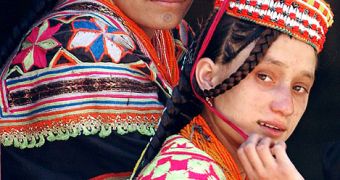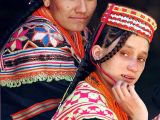These people are said to descend from the soldiers of Alexander the Great, stranded and established in foreign lands. Kalash people call the peak of the mountains with a word that does not require explanations: Olympus. The discovery in the '80s of Greek inscriptions in a former Kalash area in Afghanistan further came to strengthen this opinion.
Ancient Greeks traded with inhabitants of very remote areas, like Himalaya and Hindu-Kush mountains. The land of the Kalash is divided between Afghanistan and Pakistan. During the 19th century, the Afghan Kalash were forced to pass to Islam and their region was named Nuristan ("The land of light"). The Kalash call their territory Chitral.
Still, 4,000 Kalash still follow ancestral ways and traditions, being considered "pagans". They survived in inaccessible valleys, out of external influences. Ramput Valley is inhabited only by pagans, divided in clans that form rural communities.
The medieval-type houses have two levels: the lower level is used as stable, while the upper level hosts the whole family in a sole room. The room is used for cooking, eating and sleeping. The fireplace is located here, and the smoke gets out through the opened door. The furniture is made of several simple beds, tables, chairs, chests and store sacs. The Kalash subsistence is ensured by goat and sheep husbandry.
The Kalash believe in the existence of 7 superimposed skies. In the upper sky lives the Creator, the main divinity called Desau or Khoda. The angels and other divinities live in the skies 5 and 6. In the skies 2, 3 and 4 live other angels that make the connection between gods and people. The angels receive the orders from the gods and transmit them to the people.
In the lower sky, the Sun and the Moon sleep, each one in the house of its mother. When the sun wakes up, his mother sends him in a journey; so does Moon's mother, to light the nights of the people.
In the 6th and 7th skies, large rivers of milk flow. The sky of Ingau (the god of health) is crossed by a river of blood. That's why the Kalash believe they have to appease the gods through sacrifices and singing during the religious feasts. When the milk river overflows, the crop will be rich and the cattle will breed. If the blood river overflows, the humans will experience disease, hunger and wars.
The enemy of the gods is Jestan, the Devil, emerged on Earth in the appearance of a dog. The Kalash chased him with stones and mocked at him. Then, the dog asked the gods for shelter, but here it only sowed Discord between the protective gods of the Kalash, soon becoming the enemy of the angels. That's why the angels chased it away with stones, which the Kalash see as falling stars...
Kil-ae-Saruz is the great Kalash festivity, dedicated to Ingau, who watches over the people, herds and crops. With this occasion, people do the rooms and women wipe the place where the dance will take place under the temple located in the open. Drums make the rhythm. The girls wear embroidered scarves and braid ribbons, while men adorn their hats with green twigs.
The festivity lasts several days, and the first day is dedicated to visiting mourning people, who are visited, are offered gifts and help for subsequent works.
The second day is dedicated to religious ceremonies. Boys go to the sacred stable of the goats, spreading millet flour over the sacrificial fire. Then, together with the men, they pour goat milk through all the houses of the clans, to chase away the evil spirits. This purifying ritual "cleans" the houses. When this ceremony ends, people gather on the dance field.
A reciter (dehar) sits in the middle of the circle, saying prayers. Men gather close to him, and women make a circle around them. The dehar is like a priest; he is an intermediary between the dead, living people and gods. While he pronounces loudly the prayers for the dead, other people of the village go to the cemetery to dig up the dead and smear their bones with sacred oils.
The women murmur the prayers, repeating after the dehar, a process that can last up to 4 hours. When drums are heard, a great joy starts: people sing, dance and express their joy as a sign of honor to Ingau. The party lasts until the dawn, when the apogee moment takes place at the temple. After listening to the oracles and taking part in the dance they are invited to, the Kalash bring offerings of goat milk and bread on the ceremonial altar.
In the fourth day of the festivity, the sowing starts. Singing, women follow the men on the fields; after finishing the sowing, sacrificial fires made of juniper wood are ignited and, by the midday, people return to the fields dancing again until late in the night.

 14 DAY TRIAL //
14 DAY TRIAL // 
